- Home
- Carrie Jones
Need Page 9
Need Read online
Page 9
“It’s okay,” Devyn says.
I clear my throat and whisper. “ ‘Eventually, the boys die, their bodies overcome by the horrors brought upon them by the pixies. The pixies, this narrator might add, have no will to fight this overwhelming need. The pixie king can be without a queen for only so long before he succumbs to the dark, torturous side of his nature, and with his weakness the other pixies also become more debased and deprived, roaming the woods, hunting for potential queens and blood tributes.’ ”
“Look,” Nick points. “In the margin.”
“What’s it say?” Issie asks.
I squint at the faded pencil marks. “ ‘Stay out of the woods.’ ”
“Good call,” Nick says. His hand drops from my shoulder. I feel abandoned, colder somehow. I go to the back of the book where the due dates are stamped. No one has taken it out since they’ve pasted in a new sheet on the back page. But there’s writing underneath it.
I start peeling off the edges while Issie says, “I am really not into this pixie thing. You guys think this is right, don’t you? About the blood tributes?”
“Yeah, I know it’s right,” Devyn says. “But what does it mean that he’s pointing at Zara all the time?”
“That’s obvious,” Nick adds. “He wants her to be his queen.”
I swallow, but I don’t look at Issie when I talk. Instead I stare into Nick’s eyes. “Why not? It doesn’t say that the pixie queens are bad.”
“It doesn’t say they’re good!” Devyn almost yells.
The magazine guy throws his Economist on the table and stomps away.
Issie lowers her voice. “We probably just haven’t read the part about the pixie queens being murdered and raped and turned into blood tributes.”
“Right,” I say.
“Zara . . . ,” Nick warns. “You’re thinking something.”
“No, I’m not,” I lie, standing up. I grab the book we’ve been reading and a couple others. “I’m going to go check these out. It’s almost dark. Betty’ll kill me if I don’t get home before dark.”
“Do you think she knows?” Devyn asks.
“Knows?”
“About the pixies?”
I imagine Betty with her gruff flannel shirts and her fact-gathering nature. “No way.”
Nick gives me a ride home to where Yoko waits alone since we carpooled. We are silent a good part of the way.
“I don’t know if I really believe this,” I finally say.
“But?”
“But if it’s true . . .”
“It sucks.”
“Basically. Yeah.”
He puts the MINI in park. “Maybe once we figure it all out we can set a trap.”
“A trap?” I pick at the back of the book, where the due date is. The little wheels in my head are working overtime.
“What are you doing?”
“Nerves, I guess,” I say and then it peels away, revealing the way that people used to take out books from libraries. There’s a list of people who had the book, all their names handwritten in neat lines. I gasp.
Nick leans over, dark and forest smelling. “What?”
The words blur on the paper. “On the take-out list. The last name.”
“Matthew White?” He looks at me.
A tear escapes out of my eye before I can trap it in there. Nick reaches out with his thumb and wipes it away.
“That’s my dad,” I stare at the name, written in his scratchy tall letters. “That means . . .”
“He knew.”
“He knew about the pixies?”
Nick nods, “But look at this.”
Written in pencil scratch around all the names like a border or something, it says, Don’t fear. Here there be tygers, 157.
“What does that mean?” I ask.
“Is might know. It sounds familiar, doesn’t it?” Nick says, but his eyes shade as he pulls out his cell phone.
“You’re not telling me something.”
“What?”
“You’re hiding something.”
“And how would you know that? You’re psychic now?”
“Your cheek is twitching. I have this, um, this theory that your cheek twitches when you lie or you’re hiding something. It’s like you’re trying to run out of your own skin.”
He shakes his head, keeps punching buttons. “I don’t know what to do with you.”
I smile. “You could just tell me what you’re thinking.”
“Hold on,” he says and then tells Issie what we found. She says something back and he hangs up.
“Well?”
He shifts his weight and slips his cell into a little nook between us. “She thinks it’s a reference to the old medieval line, ‘Here there be dragons.’ It was used on maps and stuff to warn sailors away from dangerous places.”
“I knew it sounded familiar.”
“Mm-hmm.”
“But that doesn’t make sense.”
“Why?”
I point at the first two words. “It says not to fear.”
“And it’s not dragons.”
“It’s tigers.”
“Weird.”
Betty comes to the front door and yells, “Are you two going to sit out there forever?”
I blush. “I should go.”
“Yeah.”
I step out of the car. The cold air bashes against me as I stuff the library book into my bag with all the others. I hoist the bag onto my shoulder, buckling under the weight.
Nicks jumps out of the car so quickly that I don’t even notice it, and he’s suddenly beside me, taking the bag off my shoulder. “Let me get it.”
I am all for equal rights and everything, but it’s pretty heavy. “Thanks.”
“No problem,” he says, walking with me to the porch where Betty’s still standing, arms crossed over her nonexistent chest, smiling at us. Nick lowers his voice to a whisper. “Don’t do anything stupid.”
“You either,” I whisper back.
Betty snorts as we clomp up the steps. “Well, Mr. Colt. Would you like to join us for dinner?”
“She’s cooking,” I warn.
Betty swats me with a dish towel. “Spaghetti. What can I do to spaghetti?”
Nick puts my bag just inside the door and actually looks scared. “That’s okay. I’ve got a steak planned at home.”
“Fine,” Betty winks at him and then winks at me. Nick blushes. “I’ll let you two say your good-byes.”
“How embarrassing,” I mutter.
Nick laughs. Dimples crinkle up the skin near his lips. I will not look at his lips. How can he never have used those? That’s a crime against humanity right there.
“Bye,” he says. “See you in school.”
“Bye,” I say, and he walks away. The sun is pretty much gone. The woods are dark, tall masses that lock the sky to the ground. Anything could be hiding there. I watch him get in the car. I watch him drive away. The whole time I expect something to jump out, grab him, and take him away, a blood tribute. I shake my head. The taillights disappear around a curve.
Betty’s hand comes around my waist and I jump.
“You’re letting the cold in,” she says, and she shuts the door.
“So, John McKee’s son has a ruptured appendix,” Betty says as the water for the spaghetti boils.
I put forks on the table. The tongs of my fork touch an old water stain that looks like a cloud on wood. “That’s too bad.”
“It’s more than too bad,” Betty grumbles. “It means that I might get called in. We’re the only paramedics in town. We’re the only ones who can handle anything big. The first responders are just the drivers. They need John or me to deal with the big stuff.”
“So?”
“So? So?” She tosses the pasta into the pot in one big clump. Half of it pokes out above the rim. “So that means I have to figure out what to do with you.”
My words come out slowly the anger right beneath the surface, bubbling. “What to do wit
h me?”
“If I have to go.”
I push her out of the way, grab the pasta spoon thing, and push at the spaghetti so it goes down beneath the boiling surface. “You can leave me here. I’m a big girl.”
“I don’t want to leave you here alone.”
“Why?”
“People get more depressed at night. Almost all my suicide calls are at night. We just want . . . we want you to be okay, Zara.”
I turn the heat off high so the water doesn’t boil out of the pot, down to medium. “Is that why Mom sent me here? Because she thought I was going to kill myself some night?”
Betty’s eyelid twitches. “She was worried about you.”
“I’m a big girl,” I mock. “I’m fine.”
“You miss your dad.”
“Of course I miss my dad!” I point the pasta spoon at her, which feels way too melodramatic. I put it on the counter by the coffee maker. “That doesn’t make me suicidal. That doesn’t mean I have to have some freaking EMT babysitter standing over me all the time.”
Betty’s face crashes down but her thin, wiry body hardens up like she’s made of steel. “Is that what you think of me?”
“No. I’m sorry. That was mean.” I swallow hard, look away from her hurt face, and turn back to the stove. I grab the stupid pasta spoon again and swirl it around in the water, pretending like it’s really important that none of the spaghetti noodles stick together. “I could come with you if you have a call.”
She sighs. “That would work, maybe. But not if it’s something complicated. You couldn’t come into the building. You’d be sitting outside in the ambulance all by yourself. Plus, it’s illegal.”
“Illegal?”
“To have civilians in the ambulance.”
I turn up the heat a little more and face her.
She smiles. “I could call that Nick boy and have him come over.”
“No!”
“What? You don’t like him? I’ve heard tell you and him and Devyn and Issie are running around all over town together. You went to the library today, right?”
“You’re spying on me?”
“No. It’s a small town. People talk.”
I shake my head, grab some glasses, and open the fridge. “You are not going to phone Nick.”
She takes some paper napkins from under the sink and flops them on the table. “There probably won’t even be a call.”
Halfway through dinner Betty’s beeper goes off.
“Crap!”
We listen to the scanner. There’s a possible cardiac arrest at the Y.
“Sorry,” she says. “You stay put till I get back. Okay? I’m calling Nick on my way in.”
“No, you aren’t!”
“Yes, I am. And don’t let anyone else in. I’m serious, Zara. Crap.” She kisses me on the top of the head and pushes a bracelet on my wrist, all hectic. “Your mom’s thinking about coming up for a visit.”
I lift up my arm. An iron bracelet dangles there. “What’s this?”
“A little gift.”
She hauls on her jacket. “I’ll be back as soon as I can. Don’t worry about cleaning up.”
“Do not call Nick!” I touch the cold metal of the bracelet.
She ignores me. “Lock the door!”
. . .
I could do the Urgent Action appeals for Amnesty. But I don’t.
I could call Nick and tell him not to come. I don’t do that either.
“This is One. I’m 10-23 at the Y,” Betty’s voice sounds from the radio she has on the counter.
The dispatcher, Josie, comes on. “10-4, Unit One. 10-23 at the Y, 1845 hours.”
In ambulancespeak 10-23 means “on location.” Anyone else would just say they were there. Unit One is Betty; 1845 hours is the time, military-style. It’s all kind of corny.
So Betty is at the Y. It is 6:45 p.m., also known as 1845 hours. How can I know this stuff? There’s a list of ten codes Betty posted on the fridge. I swear I’ve memorized half already. Maine is turning me into such a geek.
I push away from the table, dump our dinner plates into the sink, and start scraping off the spaghetti. Betty hasn’t finished hers because she dashed out, so I change my mind and wrap it up, storing it away in the fridge. She might be hungry later. I keep scraping mine away. It is no fun eating alone.
I stare out the window above the sink at the dark woods. The moon is full and it makes everything glow and look almost pretty. Even the snow looks nice, not so cold. I bet the guy is out there, the pixie guy. And I bet if I go out there he’ll find me, and then maybe I’ll get some answers. And I’m not a boy, so I don’t think I’m in any real danger.
Betty’s voice is back on the radio, “I’ll be 10-6, taking one forty-five-year-old male to Bangor. He’s CH3. 10-4?”
Cardiac issues. Chest pain. Just like my dad.
“10-4,” says Josie at dispatch.
“10-4,” I say to the radio, as if they can hear me. “I’ll be 10-6, going running, looking for a pixie guy. 10-3?”
I rush up the stairs into my room and start pulling out running clothes. I have tights for the cold weather and a layer of Under Armour to wick the sweat away from my skin. It’s the sweat that makes you feel cold. I find a wool hat in Betty’s closet and put it over my hair, which is the worst look imaginable when you have lots of fine hair like I do, but it isn’t like I’m going to a beauty pageant, trying to be Miss Maine or something. I’m going running in the dark, nobody will see me. Until Nick gets here.
That’s right.
I am going running and maybe I’ll find that boy-stealing pixie guy. I pull the hat on and pause for a second without really thinking about it, and look in the mirror at the paler, thinner version of me that I’ve become. Even my eyes are dull. Blue, but not as blue as they used to be. If my dad were here he’d be taking my temperature and trying to feed me French onion soup. But it isn’t my body that’s sick. It’s my insides. My insides are hollow. My insides are hollow because I’ve been too scared of living and going on, which is totally self-indulgent and awful, because think of all those people in prisons for nothing—for blogging, for speaking, for thinking differently. They’d probably give anything to move forward, to go on.
Is there a name for this fear? I’m not sure; I should look it up. There’s tachophobia, which is a fear of speed, of moving too fast.
I shake myself out of my haze and lace up my sneakers. This is the first step in moving forward, the first step in pixie hunting, the first step in taking control of my life, because I can.
I text a message to Issie, telling her I’m going for a quick run and that we should do some more Internet investigating tomorrow at lunch. Then I text Nick.
Gone running. See you ON ROAD.
There, my bases are covered and I’m going pixie hunting.
Scotophobia
the fear of darkness
My mother is afraid of the dark.
When I was little we had nightlights all over the house, not just in my bedroom and the bathroom. There were two in the upstairs hallway, one in every guest room, one in the kitchen, the dining room, the downstairs bathrooms, the living room, everywhere.
I asked her about it once. We were in the kitchen. I was sitting on the counter, feet dangling, wearing my Elmo pajamas and watching her cook. “Why are you scared of the dark, Mommy?”
She’d been making pancakes, stirring up the batter. She spilled blueberries into the bowl and stirred and stirred.
“I’m not.”
“Then why do we have a million nightlights?”
She banged the spoon against the big ceramic bowl, the one with the two maroon stripes around the rim. “That’s so you don’t get scared.”
“I’m not scared,” I said. “I like the dark.”
“No, you don’t.”
She stared at me, her face hardening into something unrecognizable. She’d stirred the batter too much and broke all the blueberries apart.
“The pancake
s are blue,” I told her.
She looked at the bowl, frowning, and let go of the spoon. “Oops!”
“It’s okay. Blue is pretty.”
She kissed me on the nose and said, “Let me tell you something, Zara. Sometimes there are things that people should be afraid of.”
“Like the dark?”
She shook her head. “No, more the absence of light. Understand?”
I nodded, but I didn’t understand, not at all.
I slam out the door and down the steps. I don’t warm up. I don’t stretch. I just start jogging under the light of the moon. Frost crystals form on the windows of the house. The trees seem heavy from the weight of the air.
There is a definite absence of light, but I’ve rigged up one of those headband flashlight things, so I won’t trip as long as I’m careful.
Something about the cold air just rips through my lungs when I run. Every breath is like an ax into my chest. Every breath is a decision I have to make, a decision to live, to go on.
It hurts but I push through it and then the pain numbs. It isn’t like it’s gone, but more like it just isn’t so wrenching anymore. I don’t think there’s any other word for it than wrenching.
Breathing should always be easy, but nothing is easy in Maine. Nothing is easy in the cold. I keep running though; turning out of the driveway and onto the main road. It’s easier to run on the asphalt than it is on the dirt because of foot placement. But it is harder on my joints and scarier too, like something is watching.
My legs stretch out and I pick up the pace, but that feeling comes back. A noise thuds in the dark forest beside me and I keep running. Maine makes me skittish. I’ve never been such a wimp. I ran through all sorts of neighborhoods in Charleston and I never got scared there.
I hate being scared.
“If you can name something, it’s not so scary,” my dad always said. “People are afraid of what they don’t know.”
I turn my head and scan the woods, but all I can make out are trees and shadows. I can’t see anyone in there or anything.
My mind fills with visions of bears and wolves, but the only bears Maine has are black bears, and they’re pretty much terrified of people. The Maine Department of Inland Fisheries and Wildlife swears that there are no wolves in Maine, just coyotes. I know this because I checked their Web site after I saw the huge paw prints in the snow my first morning. I told Grandma Betty about them. What had she said?

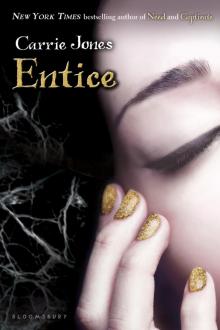 Entice
Entice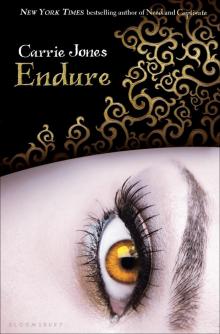 Endure
Endure Need
Need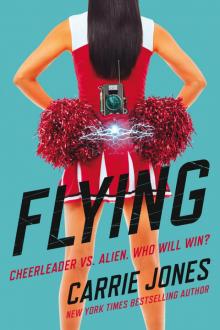 Flying
Flying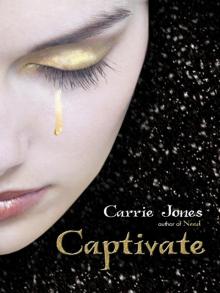 Captivate
Captivate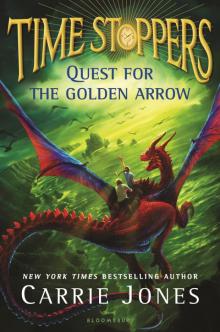 Quest for the Golden Arrow
Quest for the Golden Arrow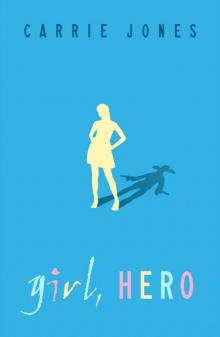 Girl, Hero
Girl, Hero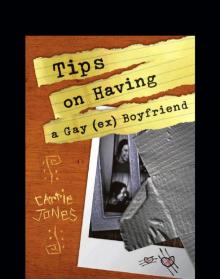 Tips on Having a Gay (Ex) Boyfriend
Tips on Having a Gay (Ex) Boyfriend Enhanced
Enhanced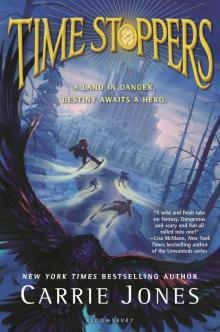 Time Stoppers
Time Stoppers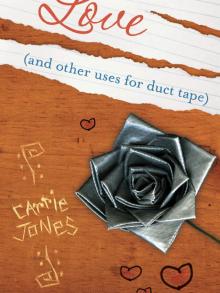 Love (And Other Uses for Duct Tape)
Love (And Other Uses for Duct Tape) Wolf's Hunger
Wolf's Hunger In the Woods
In the Woods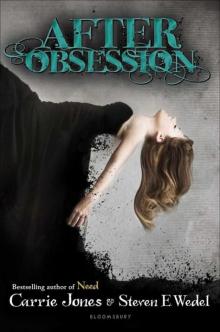 After Obsession
After Obsession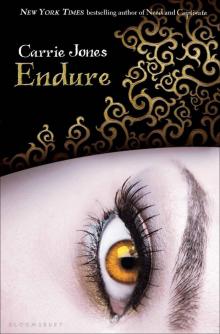 Endure (Need)
Endure (Need) Need np-1
Need np-1